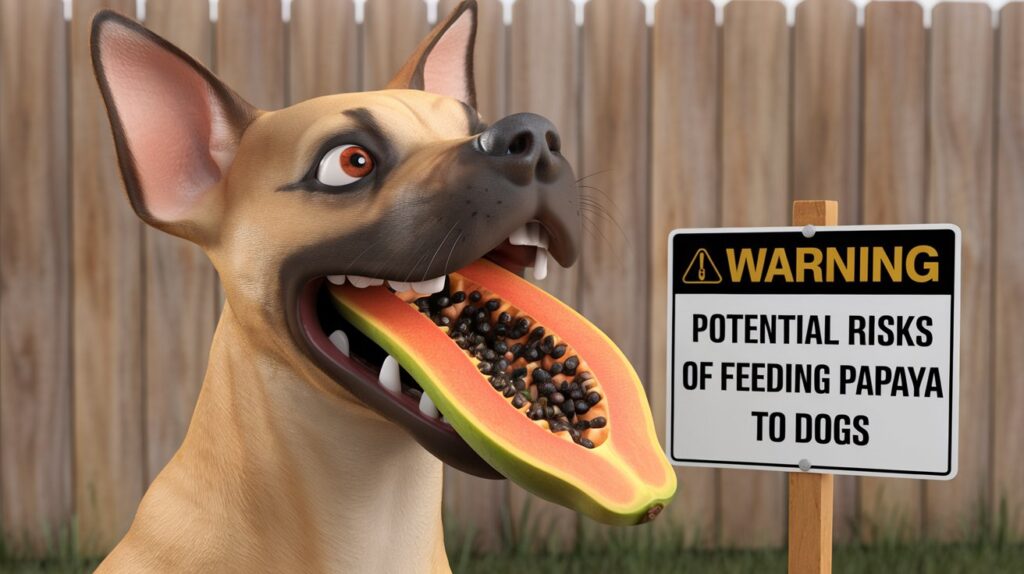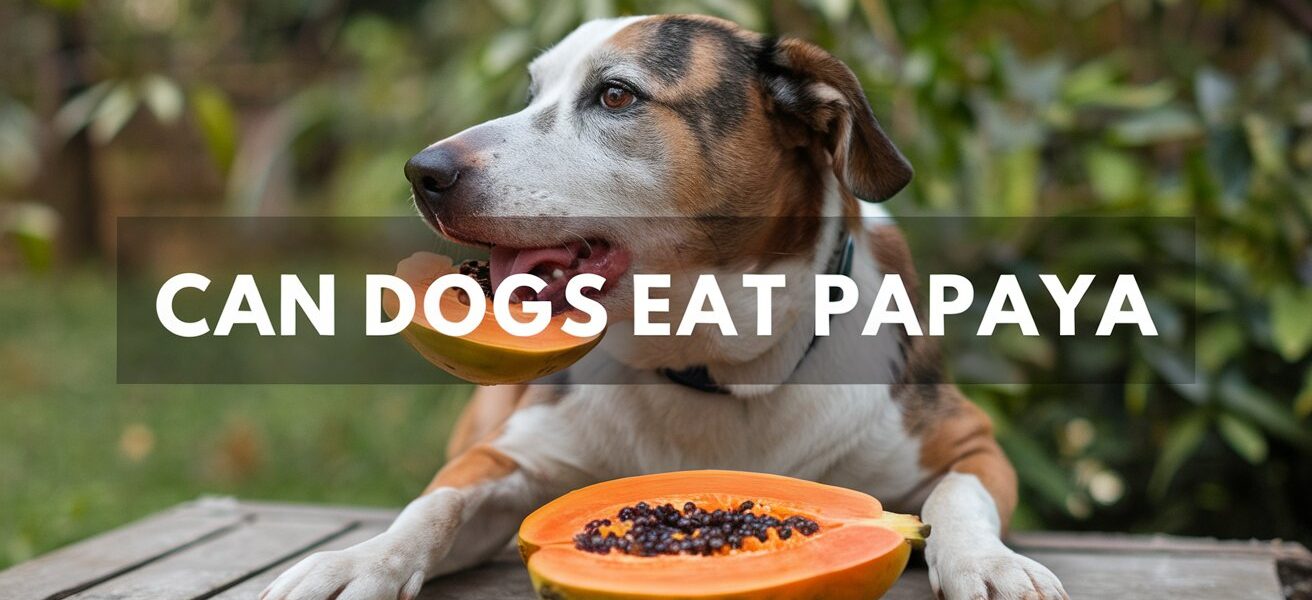- Homepage
- Dogs Nutrition
- Can Dogs Eat Papaya? Health Benefits, Dangers, and Feeding Tips
Can Dogs Eat Papaya? Health Benefits, Dangers, and Feeding Tips

Table of Contents
ToggleCan Dogs Eat Papaya?
Yes, dogs can eat papaya in moderation. This tropical fruit is rich in vitamins A, C, and E, which support a dog’s immune system and overall health. Papaya also contains fiber and digestive enzymes that can aid in digestion. However, removing the seeds and skin before feeding it to your dog is important, as these parts can be harmful. Additionally, overfeeding papaya may lead to stomach upset or diarrhea, so it should be given as an occasional treat rather than a regular part of their diet.
What is Papaya?
Papaya is a tropical fruit loved for its sweet, juicy flavor and vibrant orange flesh. It’s rich in vitamins, antioxidants, and digestive enzymes that benefit humans. But before feeding it to your dog, it’s essential to understand if these nutrients translate well for canines.
Is Papaya Safe for Dogs?
The short answer is yes—dogs can eat papaya, but there are a few caveats. When given in moderation and prepared properly, papaya can be a healthy addition to your dog’s diet. However, not all parts of the fruit are safe, and overfeeding could lead to digestive issues.
Health Benefits of Papaya for Dogs
Rich in Vitamins and Minerals
Papaya is loaded with vitamins A, C, and E, which are important for maintaining a dog’s immune system, skin health, and eyesight. Vitamin C, in particular, helps reduce inflammation and improve the overall health of your pet.
Supports Digestive Health
Papaya contains an enzyme called papain, which aids in digestion and helps dogs break down proteins more effectively. If your dog has mild digestive issues, a small amount of papaya can help ease the discomfort.
High in Fiber
The fiber content in papaya can promote healthy digestion and prevent constipation. However, too much fiber could lead to stomach upset, so it’s important to feed papaya in moderation.

Potential Risks of Feeding Papaya to Dogs
While papaya is generally safe for dogs, there are some risks you should be aware of.
Avoid the Seeds
Papaya seeds contain small amounts of cyanide, which can be harmful if consumed in large quantities. Make sure to remove all seeds before feeding papaya to your dog.
Choking Hazard from the Skin
The skin of the papaya is tough and can be difficult for dogs to chew, posing a choking risk. Always remove the skin and cut the fruit into bite-sized pieces to avoid any hazards.
Overfeeding Can Cause Diarrhea
As with any fruit, too much papaya can upset your dog’s stomach. Overfeeding could lead to diarrhea or other digestive issues, so it’s best to offer small amounts as an occasional treat.
How to Safely Feed Papaya to Your Dog
Here’s how you can safely prepare and serve papaya to your dog:
Choose a Ripe Papaya
Make sure the papaya is fully ripe, as unripe fruits can be difficult to digest. A ripe papaya will have a soft texture and a vibrant orange color.
Remove Seeds and Skin
Before serving, remove all seeds and peel the skin. Both can be harmful to your dog, so take the extra step to ensure the fruit is safe.
Cut Into Small Pieces
Chop the papaya into bite-sized pieces to make it easy for your dog to eat. This also reduces the risk of choking.
Feed in Moderation
A few pieces of papaya once in a while is fine, but don’t make it a daily treat. Stick to a small serving—around one to two tablespoons for a medium-sized dog.
Can Dogs Be Allergic to Papaya?
Just like with any food, some dogs may be allergic to papaya. If you’re introducing papaya to your dog’s diet for the first time, start with a small piece and watch for any allergic reactions like itching, swelling, or difficulty breathing. If your dog shows signs of an allergic reaction, contact your vet immediately.
Alternative Fruits for Dogs
If your dog doesn’t like papaya or shows signs of intolerance, other fruits are safe and healthy for dogs, such as:
- Apples (without seeds)
- Bananas
- Blueberries
- Strawberries
- Watermelon (seedless)
| Fruit | Benefits | Precautions |
|---|---|---|
| Apples | Rich in vitamins A and C, good for dental health | Remove seeds and core as they contain cyanide |
| Bananas | High in potassium, supports muscle and heart health | Feed in moderation to avoid high sugar intake |
| Blueberries | Packed with antioxidants, supports brain health | Serve in small quantities due to sugar content |
| Strawberries | High in vitamin C, helps with immune function | Remove leaves and feed in moderation |
| Watermelon | Hydrating contains vitamins A, B6, and C | Ensure it’s seedless and avoid the rind |
| Cantaloupe | Rich in vitamins A and C, low-calorie treat | Avoid feeding the rind as it can cause choking |
| Pineapple | Full of vitamins and digestive enzymes | Remove the tough core and outer skin |
| Mango | High in vitamins A, B6, C, and E | Remove the pit as it contains small amounts of cyanide |
| Pears | Great source of fiber and vitamin C | Remove seeds and core, feed in small portions |
| Peaches | Full of vitamins A and C | Remove the pit, as it can cause choking and toxicity |
Each of these fruits provides different vitamins and nutrients that can benefit your dog.
Conclusion: Can Dogs Eat Papaya?
In conclusion, papaya can be a healthy, tasty treat for your dog when fed in moderation and prepared correctly. The key is to remove the seeds and skin and serve only the flesh of the fruit. Remember, fruits should only make up a small part of your dog’s diet—stick to balanced dog food for the majority of their meals.
FAQs: Can Dogs Eat Papaya
1. How much papaya can I give my dog?
You can give your dog a small amount of papaya, about 1-2 tablespoons for a medium-sized dog, as an occasional treat.
2. Are papayas toxic to dogs?
No, papayas are not toxic to dogs, but the seeds and skin should be removed as they can cause harm.
3. Is papaya a laxative for dogs?
Papaya has fiber that can aid digestion, but too much can act as a laxative and cause diarrhea.
4. Why does my dog like papaya so much?
Dogs may enjoy the sweet taste and juicy texture of papaya, as well as the natural sugars in the fruit.

Jahanzaib Kaleem is a passionate and knowledgeable pet writer and veterinarian dedicated to enhancing the well-being of pets and educating pet owners around the world. With years of experience in veterinary medicine and a deep love for animals, Jahanzaib combines his medical expertise with a flair for writing to deliver insightful and practical advice on pet care.





